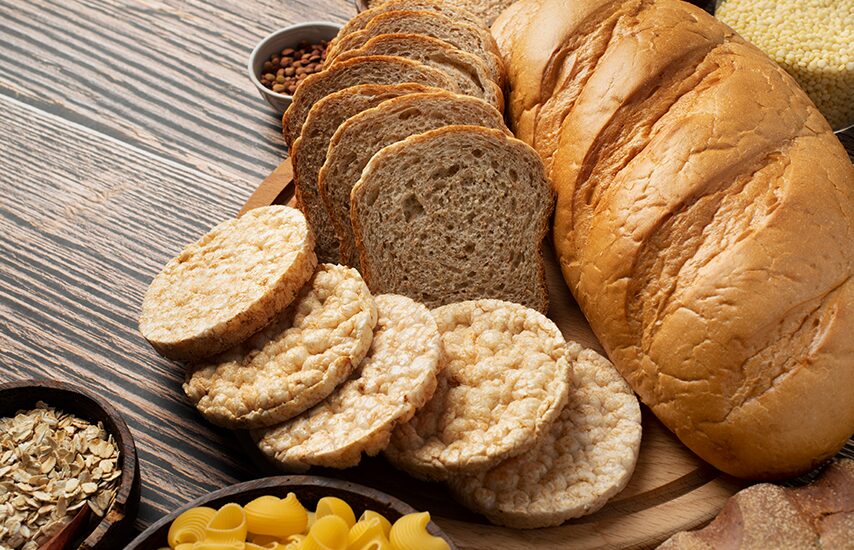Quick and Effective Strategies to Alleviate Gluten-Induced Bloating

Are you wondering how to get rid of gluten bloat fast? Gluten-induced bloating can be quite uncomfortable, but fret not; we’ve got you covered with some quick relief strategies. Whether you have celiac disease, gluten sensitivity, or gluten intolerance, understanding the causes and finding effective solutions is essential.
In this article, we will explore ways to alleviate gluten-induced bloating and improve your digestive well-being.
Understanding Gluten Bloat
Gluten-induced bloating often plagues those with celiac disease, gluten sensitivity, or those who are gluten intolerant. When individuals with these conditions consume gluten, whether knowingly or accidentally, it can lead to abdominal pain, stomach cramps, and, in some cases, joint and muscle pain.
The digestive tract’s inflammatory response to gluten exposure can cause various symptoms, including brain fog and digestive issues. Research suggests that even those without these conditions may experience similar symptoms after ingesting gluten.
Stay tuned as we delve into quick relief strategies to reduce bloating and discomfort caused by gluten exposure.
Quick Relief Strategies

When you accidentally eat gluten or experience gluten-induced bloating, you’ll want to find relief fast. Here are some strategies to help you get rid of gluten bloat fast:
- Digestive enzymes. Some individuals find relief from gluten-induced bloating by taking digestive enzyme supplements. These supplements assist in breaking down complex nutrients, potentially reducing the strain on your digestive system and minimizing symptoms like stomach cramps and gas.
For example, ginger tea has digestive enzymes that can soothe your digestion and alleviate abdominal pain, while peppermint tea is known for its ability to relax the muscles of the gastrointestinal tract, reducing stomach pain and gas. Apple cider vinegar is another option, as it may improve digestive issues and help with nutritional deficiencies.
- Gut-boosting foods. Incorporating gut-friendly foods into your diet can be an effective way to alleviate bloating. Consider including foods rich in probiotics and prebiotics to support a healthy gut microbiome. These foods encourage the growth of good bacteria, which can improve digestive health and reduce gastrointestinal symptoms.
- Nutritional support. If you suspect gluten-induced bloating is leading to nutritional deficiencies, consult with a healthcare provider to explore appropriate supplementation. Addressing any nutrient gaps in your diet can help you feel better and prevent long-term health concerns.
While these quick relief strategies can help alleviate gluten-induced bloating, it’s essential to consult with a healthcare provider if your symptoms persist or worsen. These remedies can provide temporary relief, but addressing the root cause of gluten sensitivity or gluten intolerance typically requires a gluten-free diet and medical guidance.
Hydration and Movement
Maintaining proper hydration and incorporating movement into your routine can effectively manage gluten-induced bloating. These strategies can provide quick relief from discomfort:
- Drinking water. Staying well-hydrated is crucial for digestive health. Drinking water helps prevent constipation and discomfort, keeping your gut functioning smoothly. Adequate hydration can also reduce bloating and promote a healthy digestive system.
- Gentle movement. Engaging in gentle physical activity, such as walking, can aid in digestion and alleviate bloating. Moving your body helps prevent stomach cramping and encourages the movement of gas through your digestive tract. This can provide relief from the discomfort associated with gluten-induced bloating.
Incorporating these practices into your daily routine can help manage the symptoms of gluten-induced bloating. However, make sure to consult with a healthcare provider for a proper diagnosis and to address any underlying issues, especially if you suspect gluten sensitivity or gluten intolerance.
Gluten-Free Remedies
When dealing with gluten-induced bloating, turning to gluten-free remedies can be an effective approach. These remedies can help you find relief from discomfort and reduce symptoms:
- Activated charcoal. Consider taking activated charcoal supplements, which may help reduce bloating and alleviate gas. Activated charcoal works by absorbing excess gas and toxins in the gut, providing quick relief from discomfort.
- Herbal infusions. Some herbal infusions, such as peppermint tea and ginger tea, are known for their digestive benefits. These natural remedies can help soothe digestive issues, including abdominal pain and bloating. Drinking a cup of herbal tea after a meal can provide relief.
- Marshmallow root. Marshmallow root supplements or teas are believed to have anti-inflammatory properties that can help reduce stomach cramping and inflammation in the digestive tract. Incorporating marshmallow root into your routine may offer relief from gluten-induced bloating.
Supplements and Probiotics

Supplements and probiotics can be valuable additions to your regimen when it comes to managing gluten-induced bloating and promoting a healthy gut. These options offer targeted support for digestive health and can help address specific concerns related to gluten intolerance. Let’s explore some essential considerations:
- Digestive enzymes. For individuals with gluten sensitivity or intolerance, digestive enzyme supplements can be a game-changer. These supplements are designed to assist in the efficient breakdown of nutrients, reducing the likelihood of gluten exposure leading to symptoms like stomach pain and bloating. Consult your healthcare provider to determine the most suitable digestive enzyme supplement for your needs.
- Probiotics for gut balance. Maintaining a healthy gut microbiome is crucial, especially if you’re prone to gluten sensitivity or Celiac disease. Probiotic supplements can introduce healthy bacteria to your digestive tract, potentially reducing inflammatory responses and supporting overall immune system function. Consider taking probiotics, such as those containing good bacteria, to improve your gut’s resilience.
Additionally, for those seeking a convenient way to support their gut health, consider exploring options like Bioma, which combines prebiotics, probiotics, and enzymes to promote a balanced gut microbiome. Integrating Bioma into your routine can complement your efforts in maintaining digestive well-being.
Remember that individual responses may vary, so seek professional guidance to determine the most suitable approach for your unique situation.
Preventing Gluten Bloat in the Future

Your journey to managing gluten-induced bloating doesn’t end with relief strategies; it’s equally important to take proactive steps to prevent future episodes. Whether you have Celiac disease, gluten intolerance, or simply want to maintain a gluten-free lifestyle, these precautions can make a significant difference in your well-being:
- Strict adherence to a gluten-free diet. If you have Celiac disease or gluten intolerance, strict adherence to a gluten-free diet is non-negotiable. Familiarize yourself with gluten-free foods and ingredients, and read labels diligently. Opt for certified gluten-free products whenever possible to minimize the risk of accidentally eating gluten.
- Cross-contamination awareness. Be vigilant about cross-contamination. When dining out or preparing meals at home, ensure that utensils, cookware, and cooking surfaces are thoroughly cleaned to prevent any gluten-containing residues from coming into contact with your food. Consider using separate cooking utensils and appliances if necessary.
- Education and advocacy. Empower yourself with knowledge about gluten-containing foods, potential hidden sources of gluten, and food preparation techniques that reduce the risk of accidental gluten exposure. Advocate for your dietary needs when dining out, and don’t hesitate to ask questions about menu items and cooking practices.
- Consult a healthcare provider. If you suspect gluten-related health issues, seek professional guidance from a healthcare provider experienced in Celiac disease, gluten sensitivity, and non-celiac gluten sensitivity. They can conduct appropriate blood tests and provide a definitive diagnosis. With their support, you can develop a tailored plan for managing your condition.
- Regular check-ups. For individuals with Celiac disease or chronic gluten sensitivity, regular check-ups with a healthcare provider are essential. These visits can help monitor your progress, address any nutritional deficiencies, and ensure that your dietary choices align with your health goals.
Remember, maintaining a gluten-free lifestyle can be challenging, but with diligence, awareness, and the right support, you can enjoy a life free from the discomfort of gluten-induced bloating. Your health and well-being are worth the effort.
Conclusion
To conquer gluten-induced bloating and ensure enduring digestive well-being, it’s vital to grasp the intricacies of gluten-related concerns, whether you adhere to a gluten-free diet or navigate the realm of non-celiac gluten sensitivity. Recognizing the repercussions of eating gluten or consuming gluten for those grappling with gluten intolerance or a gluten allergy marks the initial stride in effectively treating gluten intolerance.
Throughout this article, we’ve explored multifaceted strategies to alleviate bloating. For those pondering a significant dietary shift, our discourse on gluten-free remedies offers valuable insights. Comprehending the subtleties of a gluten-free diet and the concealed sources of accidental gluten exposure is pivotal for sustained relief.
Armed with the right strategies, a mindful approach to dietary choices, and the backing of products like Bioma, you can bid farewell to gluten-induced bloating and embark on a journey toward lasting digestive comfort and vitality. Your journey to digestive well-being begins now!
References
- Czaja-Bulsa, G. (2015). Non coeliac gluten sensitivity–A new disease with gluten intolerance. Clinical nutrition, 34(2), 189-194.
- Catassi, C. (2015). Gluten sensitivity. Annals of nutrition and metabolism, 67(Suppl. 2), 15-26.
- O’leary, C., Wieneke, P., Buckley, S., O’regan, P., Cronin, C. C., Quigley, E. M., & Shanahan, F. (2002). Celiac disease and irritable bowel-type symptoms. Official journal of the American College of Gastroenterology| ACG, 97(6), 1463-1467.
- Wilkinson, J. M., Cozine, E. W., & Loftus, C. G. (2019). Gas, bloating, and belching: approach to evaluation and management. American family physician, 99(5), 301-309.
Related articles



